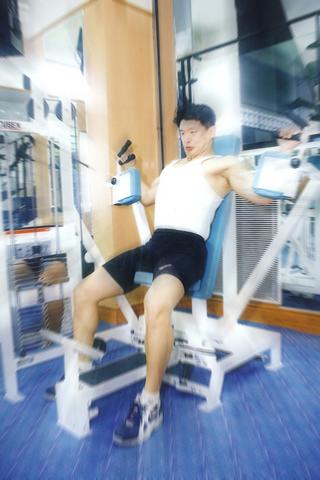Lee Meng-hsian (
Lee is running to keep pace with a fitness craze that is one of the strongest recent trends to grip Taiwan and Asia. In the past three years, two of the largest fitness franchises in the US have set up shop in Taiwan and dozens of imitators have followed suit. All of them have been proselytizing the benefits of physical fitness; a lesson which hasn't been lost on a traditionally very health-conscious population.

PHOTO: TAIPEI TIMES FILE PHOTO
Of course exercise is nothing new to Taiwan. Small groups have long gathered in the early mornings in most every park on the island to practice tai chi, or else wave their arms around as if they were doing so. But this isn't tai chi in the park nor the arm-waving and limb-slapping exercises fancied by elderly Taiwanese. The fitness fever that has infected the nation is about more than keeping healthy. For the twentysomething disciples of the body beautiful, exercise borders on religious devotion.
"I come every other day directly after work and once or twice on the weekend, depending on whether I worked out three times during the week or four," Lee says over the frenetic beat of a Leon Lai (
Lee is exactly the kind of member sought after by Taiwan's rapidly expanding number of health clubs. Five years out of college and already only a few rungs from the top of the advertising company for which he works, he walked into the Hsimenting branch of California Fitness of his own accord and within 40 minutes signed away tens of thousands of NT dollars. He's since convinced three friends to join.
"You walk past the place and all this energy comes out. They don't hardly need advertising, they have word-of mouth ... and posters of Pamela Anderson." Of the foreign-owned clubs that have entered the local market, California Fitness has made the biggest splash, with three branches in Taipei City and another planned for Taichung.
Golds, perhaps the most recognizable name in the health club industry, also has a branch in Taipei City and is actively looking for a suitable location for a second branch. "We hope eventually to open two more branches in the Taipei area, but for now we're looking at properties near MRT stations," says Linda Chao (
Independent newcomer Hollywood is nearing completion of a 1,100-ping (3,600 ㎡) facility with an outdoor pool in Tienmu which is scheduled to open in April. And Alexander Health Clubs (亞力山大俱樂部), which has long enjoyed a near monopoly in Taiwan, operates 22 branches and reports a membership of 160,000. Faced with the recent competition, the company has slowed its previous rate of expansion from eight branches per year to two, but is also expanding into the China market.
As waistlines grow thinner, so do wallets. The average cost for a one-year membership to one of these clubs is around NT$20,000. Ironically, for people like Lee, the hefty admission price has associated benefits.
"When you pay the membership fee you really become committed to coming. If I only come once a week each of those visits costs a lot more than they do if I come four or five times a week," says Lee, setting financial as well as physical benchmarks.
His friend, Andrew Chou, is more nonchalant. "You spend the money, you come here and run and lift weights or do aerobics or whatever and you feel better. It's an investment." Or is it?
Asked which came first; fitness centers or the fitness craze, most of the people interviewed for this article said fitness centers. Few people claimed to exercise at all before joining their current health club. Lee could only cite his military training and Chou the occasional game of basketball. It's as if health clubs invented the idea of being healthy.
But reminded that they could get an equivalent -- and much less expensive -- workout by rearranging their furniture every night, Lee and Chou remain convinced of the benefits of membership.
Standing beside the glass wall of an aerobics studio, they glance over their shoulders at the class in progress. Two dozen or more people, mostly young women, stand doubled over with their butts in the air. "Yeah well," Chou says. His voice trails off but his point is made.
So, the benefit to joining a health club -- besides watching yourself get in great shape -- is watching what great shape others are already in. The health clubs, for their part, always take this basic instinct into consideration, even if they handle it in different ways.
All California Fitness centers are outfitted with glass walls, making it easy for people outside to see in and those inside to peer in on the action in the studios. By contrast, Golds partitioned off one whole floor of their facility over a year ago and reserved it for women only. Other clubs market themselves to the gay community. But for all the glass walls and Spandex pants, and despite all the leering eyes and double-takes, no one is talking about sex.
"This is my ritual," says Janni Hsu. "Leaving work, coming to the gym, changing into sweats ... it can change my frame of mind, too. My face always turns red when I sweat, but I don't care anymore."
And how does she feel about glass walls and leering eyes. "Well ... the classes are almost all girls and the guys just stand around the weight machines. Nobody talks to anybody unless they know them. I think most people join just to get in shape."

In the next few months tough decisions will need to be made by the Taiwan People’s Party (TPP) and their pan-blue allies in the Chinese Nationalist Party (KMT). It will reveal just how real their alliance is with actual power at stake. Party founder Ko Wen-je (柯文哲) faced these tough questions, which we explored in part one of this series, “Ko Wen-je, the KMT’s prickly ally,” (Aug. 16, page 12). Ko was open to cooperation, but on his terms. He openly fretted about being “swallowed up” by the KMT, and was keenly aware of the experience of the People’s First Party

Not long into Mistress Dispeller, a quietly jaw-dropping new documentary from director Elizabeth Lo, the film’s eponymous character lays out her thesis for ridding marriages of troublesome extra lovers. “When someone becomes a mistress,” she says, “it’s because they feel they don’t deserve complete love. She’s the one who needs our help the most.” Wang Zhenxi, a mistress dispeller based in north-central China’s Henan province, is one of a growing number of self-styled professionals who earn a living by intervening in people’s marriages — to “dispel” them of intruders. “I was looking for a love story set in China,” says Lo,

It was on his honeymoon in Kuala Lumpur, looking out of his hotel window at the silvery points of the world’s tallest twin skyscrapers, that Frank decided it was time to become taller. He had recently confessed to his new wife how much his height had bothered him since he was a teenager. As a man dedicated to self-improvement, Frank wanted to take action. He picked up the phone, called a clinic in Turkey that specializes in leg lengthening surgery — and made a booking. “I had a lot of second thoughts — at the end of the day, someone’s going

Aug. 25 to Aug. 31 Although Mr. Lin (林) had been married to his Japanese wife for a decade, their union was never legally recognized — and even their daughter was officially deemed illegitimate. During the first half of Japanese rule in Taiwan, only marriages between Japanese men and Taiwanese women were valid, unless the Taiwanese husband formally joined a Japanese household. In 1920, Lin took his frustrations directly to the Ministry of Home Affairs: “Since Japan took possession of Taiwan, we have obeyed the government’s directives and committed ourselves to breaking old Qing-era customs. Yet ... our marriages remain unrecognized,